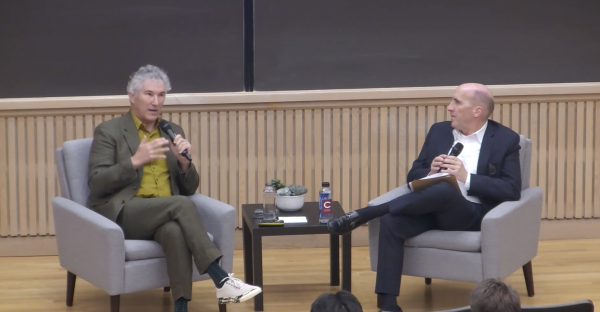AMS Student Studies Intifada’s Effects on Palestinian Christians
“The entire class began to call him ‘professor’ within about two classes, because he’s so well spoken, knowledgeable, and kind of looks like a professor,” Professor of Geology Karen Harpp said of junior John Drymon. Everyone who knows Drymon cannot say enough about his positive qualities. “[He has] a thousand strengths,” Harpp said of Drymon. “He’s extremely intelligent, well spoken, insightful, a forward thinker, not afraid to speak his mind and has a great sense of humor.”Drymon used many of these strengths this summer when he traveled extensively in Israel and the Palestinian Territories, focusing primarily on Jerusalem, the Galilee and Christian settlements in the West Bank. He performed research in these locations from mid-May to mid-August.Drymon was able to finance this trip because he is a member of Alumni Memorial Scholars (AMS), a designation awarded to Colgate’s top 200 applicants each year. “These are students who have gone far above and beyond, both academically and in their personal activities.” Assistant Dean of Admissions Melanie Kiechle said.One AMS perks is the opportunity to apply for up to $5,000 to put toward research. Drymon spent the entire $5,000 on this trip.”My research concerned the effects of the Second Intifada on Palestinian Christians,” Drymon said. One of Drymon’s friends, junior Patrick Krisak, understands the importance of this research.”While most would think only of the Jewish Israeli oppressors and the Muslim Palestinians in Occupied Palestine, John was interested in the Christian views represented there,” Krisak said. “It is important for us to remember this forgotten group.” Junior Mikey Carrington agreed.”I think his research was fascinating,” he said. “Here’s a guy who has a very genuine devotion to theology and pretty strong religious convictions. Yet, he also has this sublime intellectual curiosity streak that led him … to find the answers for himself.”Drymon mainly used interviews to conduct his research. “In my three months in Israel and the Occupied Palestinian Territories, I interviewed Arab Christian clergy, religious, and laypeople, museum curators, special collection librarians and representatives of foreign humanitarian organizations,” he said. Drymon explained some of the intricacies of the current Arab-Israeli conflict. “Israel and the Palestinian Territories are currently embroiled in what is known as the Second Intifada, which erupted in 2000,” Dryman said. “Whereas, in the First Intifada, Arab Christians played a prominent role in the effort, the Second Intifada, due in main to the Islamic overtones in this so-called ‘Al-Aqsa’ Intifada, has failed to garner the support of the 13 percent Christian minority.” According to Drymon, the Christian Palestinians now find themselves caught between two worlds. “A saying goes that before the Intifada nobody cared whether your name was George or Mohammed,” Dryman said. “Now, many Muslim Palestinians see their Christian brothers and sisters as collaborators with the Israelis, and many Israelis see them as rebellious Palestinians.” Drymon explains the effects of this conundrum. “Since the beginning of the Intifada, there has been a sharp increase in Arab Christian emigration to the West,” he said. “Sadly, in twenty or thirty years, the only Christians left in Israel/Palestine may be the foreign clergy overseeing the churches and shrines.” Drymon also emphasized the positive impact the Church has had. For example, it has established schools and universities in the various reasons. Additionally, the Church is in finding common ground and standing up to inequities in government in some places. “A couple of years ago, a number of churches stopped fighting amongst themselves for a while in order to fight the Israeli government’s attempt to begin taxing churches (something Synagogues and Mosques do not have to deal with),” Drymon said.These kind of examples demonstrate Drymon’s great knowledge of and devotion to his research subject. His friends have even noticed some changes since he has been back. “He can now wax on the state of the Eastern Orthodox church in Jerusalem, as he’s making superb Turkish coffee and throwing in some Arabic words to spice up his conversation,” Carrington said. “Learning can only work if your mind is open and the switch is flipped to ‘on.’ John is that way all the time. I’m really proud of him.” Krisak feels similarly.”We live in a world where many, including myself, find the task of effectively relating and sharing religious experience with others difficult,” he said. “This difficult task is central to John’s life. He is truly an evangelist.”Not surprisingly, Drymon participates in many activities on campus. He serves as the Director of Colgate’s chapter of Habitat for Humanity. As a philosophy major, he is also involved in Students for Social Justice and Best Buddies.”Does he have any siblings?” Professor of Philosophy Ulrich Meyer asked. “We need more students like him.”




